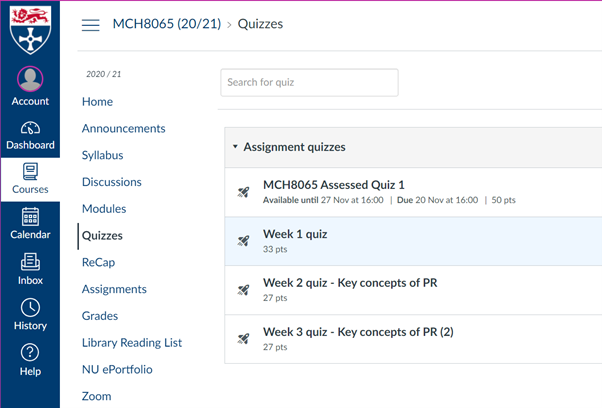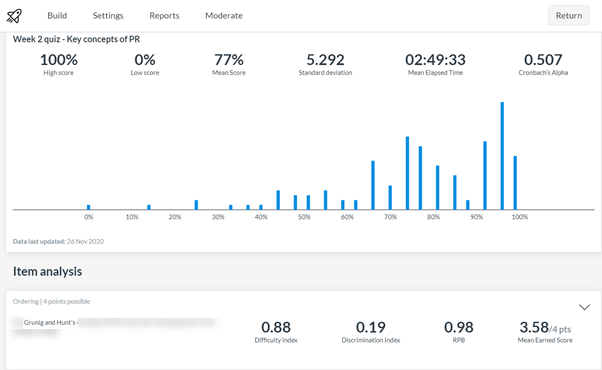Jonathan Ward, Lecturer in Public Relations
School of Arts and Cultures
Faculty of Humanities and Social Sciences
What did you do?
Redesigned MCH8065 Theoretical Approaches to Public Relations for delivery in 2020/21 to incorporate weekly quizzes which are both assessed and unassessed.

Course welcome image
MCH8065 is a 20 credit module with 160 students, a core post-graduate module delivered by the School of Arts and Cultures (SACS). Until this year it was assessed by a 25% on-campus computer exam with a 75% written academic essay.
The module has been redeveloped for delivery in 2020/21 and has a weekly pattern consisting of
· Learning streams to replicate the lecture material
· A Canvas quiz
· Small group teaching sessions
· A consolidation session
Most of the weekly Canvas quizzes are formative with the exception of two summative quizzes running in weeks 4 and 8. Each of these contribute 12.5% of the total marks.

Examples of quizzes in Canvas
Who is involved?
Jonathan Ward, Lecturer and Module Leader
How did you to it?
I explored Canvas quizzes over the summer, attended Canvas training sessions and had follow up conversations with LTDS colleagues to give more detailed guidance on the quiz settings.
For each week, I authored questions to test students’ understanding of the week’s material. The formative tests that ran in the first few weeks helped identify issues with some question types (i.e. lack of partial credit) allowing me to give clearer instructions for the first summative quiz in week 4. The week 4 quiz covered the material from the start of term.
Why did you do it?
Students have always responded positively to informal quizzes that I have introduced at the beginning of in-person lectures and I was keen to replicate this, taking advantage of the ease of delivering quizzes in Canvas.
There are two huge benefits: students can check their understanding and make sure they are following concepts and applying these correctly; and for those of us delivering the module, we can see which students are struggling with which concepts.
We have also been able to use Canvas quiz reports to identify how well students were understanding key topics, and then revisit concepts in one of our consolidation sessions. The quiz results gave us a lever to have that follow-on conversation, and demonstrated to students the importance of their use of the quizzes.

Canvas Quiz Report
Does it work?
So far around 75% of students have engaged with the formative quizzes. Feedback on the module from the mid-module survey has been positive and several students have commented on quizzes – demonstrating that they are being used as we intended.
Student voice
“The quiz helps me to review the points that I don’t know well – and then we can conduct pre-class preparations and ask questions in the course of our preparation process. Pre-study is a really effective thing on this module”
“I like the weekly quiz – I think it is helpful to review the important parts of the module”
“The weekly quiz has helped me review what I have learned in the week before”
“The weekly quizzes are good”
Interested in finding out more
Sign up to a Canvas Quiz webinar or take a look at the Digital Learning website for lots of Quiz resources.
Graduate Framework
This approach develops the following attributes:
- Digitally capable
- Curious
Staff can find out more about the Graduate Framework on the University intranet.
